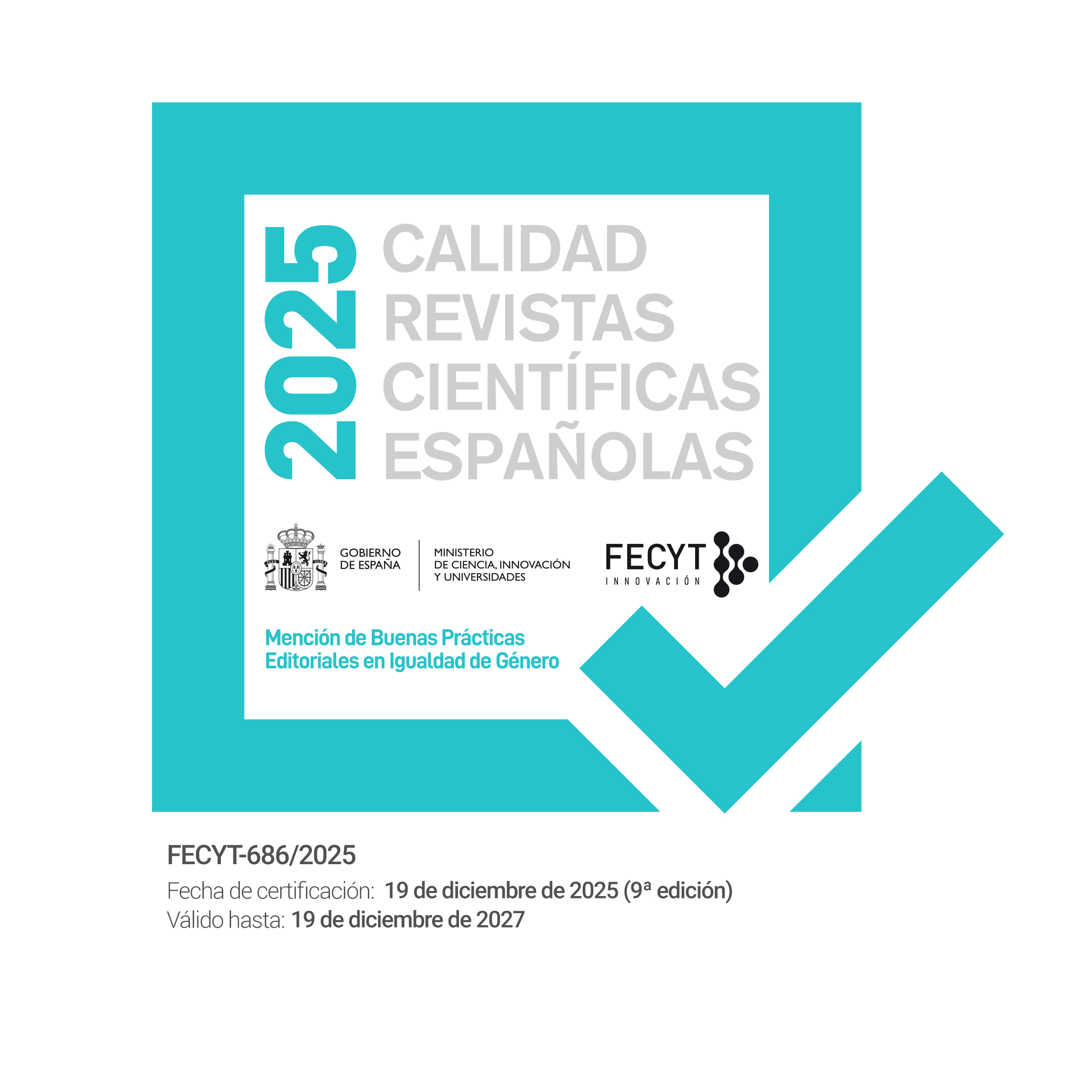The relationship between emotional intelligence with the Big Five in Spanish undergraduates.
DOI:
https://doi.org/10.55414/ap.v39i2.903Keywords:
Emotional intelligence, Personality, Big Five, Higher educationAbstract
The goal of this research is to analyze the relationship between emotional intelligence with the Big Five personality model. A sample of 300 undergraduate students between the ages of 18 and 69 (M = 21.41; SD = 4.99) filled the Trait Meta Mood Scale (TMMS-24, Salovey, Mayer, Goldman et al., 1995) and the Ten Item Personality Inventory (TIPI; Gosling, Rentfrow, & Swann, 2003). The correlation analysis performed shows some overlap between the dimensions of emotional intelligence and the Big Five factors. The results of the regression analyses are in line with trait emotional intelligence model and support the association between certain factors of the Big Five (particularly with extraversion and emotional stability) and the dimensions of emotional intelligence. The present study contributes to expanding the literature on the relationships between emotional intelligence and personality. Keywords: emotional intelligence; personality; Big Five; higher education.Downloads
References
Augusto Landa, J.M., Pulido Martos, M. y López-Zafra, E. (2010). Emotional intelligence and personality traits as predictors of psychological well-being in Spanish undergraduates. Social Behavior and Personality: An International Journal, 38(6), 783-793 [DOI: 10.2224/sbp.2010.38.6.783].
Barraza-López, R.J., Muñoz-Navarro, N.A. y Behrens-Pérez, C.C. (2017). Relación entre inteligencia emocional y depresión-ansiedad y estrés en estudiantes de Medicina de primer año. Revista Chilena de Neuro-Psiquiatría, 55(1), 18-25 [DOI: 10.4067/s0717-92272017000100003].
Cabello, R., Navarro Bravo, B., Latorre, J.M. y Fernández-Berrocal P. (2014). Ability of university-level education to prevent age-related decline in emotional intelligence. Frontiers in Aging Neuroscience, 6, 37 [DOI: 10.3389/fnagi.2014.00037].
Cabello, R., Sorrel, M.A., Fernández-Pinto, I., Extremera, N. y Fernández-Berrocal, P. (2016). Age and gender differences in ability emotional intelligence in adults: A cross-sectional study. Developmental Psychology, 52(9), 1486-1492 [DOI: 10.1037/dev0000191].
Chopik, W.J. y Kitayama, S. (2018). Personality change across the life span: Insights from a cross‐cultural, longitudinal study. Journal of Personality, 86(3), 508-521 [DOI: 10.1111/jopy.12332].
Conrad, N. y Patry, M.W. (2012). Conscientiousness and academic performance: A mediational analysis. International Journal for the Scholarship of Teaching and Learning, 6(1), 8 [DOI: 10.20429/ijsotl.2012.060108].
Costa, P.T.Jr. y McCrae, R.R. (1992). Revised NEO Personality Inventory (NEO-PI-R) and NEO Fiv Factor Inventory (NEO-FFI) Professional Manual. Odessa, FL: Psychological Assessment Resources.
Damian, R.I., Spengler, M., Sutu, A. y Roberts, B.W. (2019). Sixteen going on sixty-six: A longitudinal study of personality stability and change across 50 years. Journal of Personality and Social Psychology, 117(3), 674-695 [DOI: 10.1037/pspp0000210].
DeYoung, C.G., Quilty, L.C., Peterson, J.B. y Gray, J.R. (2014). Openness to experience, intellect, and cognitive ability. Journal of Personality Assessment, 96(1), 46-52 [DOI: 10.1080/00223891.2013.806327].
Fernández-Berrocal, P. y Extremera, N. (2006). Emotional intelligence: A theoretical and empirical review of its first 15 years of history. Psicothema, 18, 7-12.
Fernández-Berrocal, P., Extremera, N. y Ramos, N. (2004). Validity and reliability of the Spanish modified version of the Trait Meta-Mood Scale. Psychological Reports, 94(3), 751-755 [DOI: 10.2466/pr0.94.3.751-755].
Ghiabi, B. y Besharat, M.A. (2011). An investigation of the relationship between personality dimensions and emotional intelligence. Procedia-Social and Behavioral Sciences, 30, 416-420 [DOI: 10.1016/j.sbspro.2011.10.082].
Gosling, S.D., Rentfrow, P.J. y Swann, W.B. (2003). A very brief measure of the Big-Five personality domains. Journal of Research in Personality, 37(6), 504-528 [DOI: 10.1016/s0092-6566(03)00046-1].
Greven, C., Chamorro-Premuzic, T., Arteche, A. y Furnham, A. (2008). A hierarchical integration of dispositional determinants of general health in students: The Big Five traits, emotional intelligence and humour styles. Personality and Individual Differences, 44(7), 1562-1573 [DOI: 10.1016/j.paid.2008.01.012].
Komarraju, M. y Karau, S.J. (2005). The relationship between the Big Five personality traits and academic motivation. Personality and Individual Differences, 39(3), 557-567 [DOI: 10.1016/j.paid.2005.02.013].
MacCann, C., Jiang, Y., Brown, L.E., Double, K.S., Bucich, M. y Minbashian, A. (2020). Emotional intelligence predicts academic performance: A meta-analysis. Psychological Bulletin, 146(2), 150-186 [DOI: 10.1037/bul0000219].
Mayer, J.D. y Salovey, P. (1997). What is emotional intelligence? En P. Salovey y D.J. Sluyter (Eds.), Emotional development and emotional intelligence: Implications for educators (pp. 3-31). Nueva York: Basic Books.
Oshio, A. (2018). Who shake their legs and bite their nails? Self-reported repetitive behaviors and Big Five personality traits. Psychological Studies, 63(4), 384-390 [DOI: 10.1007/s12646-018-0462-x].
Oshio, A., Abe, S., Cutrone, P. y Gosling, S.D. (2013). Big Five content representation of the Japanese version of the ten-item personality inventory. Psychology, 4(12), 924-929 [DOI: 10.4236/psych.2013.412133].
Parodi Úbeda, A., Belmonte Lillo, V., Ferrándiz García, C. y Ruiz Melero, M.J. (2017). La relación entre la inteligencia emocional y la personalidad en estudiantes de Educación Secundaria. International Journal of Developmental and Educational Psychology. Revista INFAD de Psicología, 2(1), 137-144 [DOI: 10.17060/ijodaep.2017.n1.v2.926].
Pérez-González, J.C. y Sánchez-Ruiz, M.J. (2014). Trait emotional intelligence anchored within the Big Five, Big Two and Big One frameworks. Personality and Individual Differences, 65(1), 53-58. https://doi.org/10.1016/j.paid.2014.01.021
Petrides, K.V. y Furnham, A. (2000). On the dimensional structure of emotional intelligence. Personality and Individual Differences, 29(2), 313-320 [DOI: 10.1016/S0191-8869(99)00195-6].
Downloads
Published
Issue
Section
License
Copyright (c) 2021 APUNTES DE PSICOLOGÍA

This work is licensed under a Creative Commons Attribution-NonCommercial-NoDerivatives 4.0 International License.



























